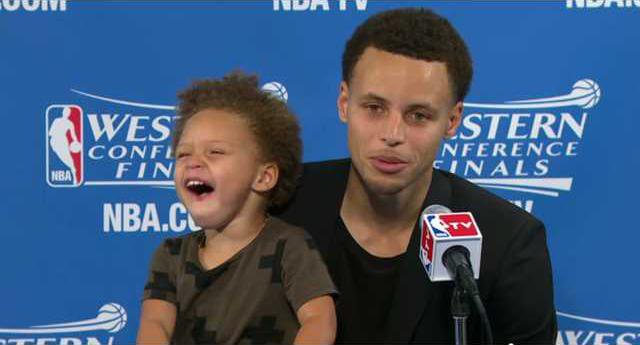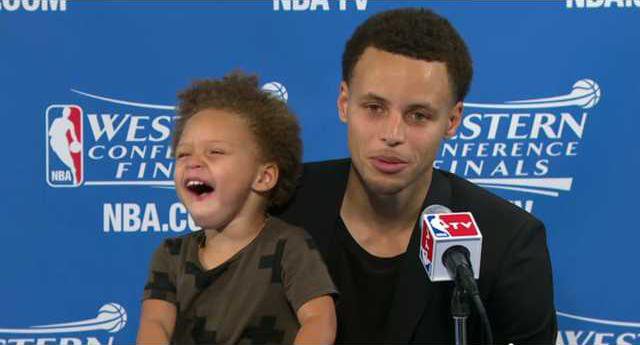BASKETBALL NATION Postgame press releases are serious business, unless a 2-year-old takes the stage.
And thats just what happened during the postgame press release after Game 1 of the Western Conference Finals when Steph Currys daughter, Riley, insisted on being in daddys lap.
As soon as Riley is sitting on her papas knee, its clear that this is her show and she will do all she can to her dad to stop talking.
There are fake yawns, laughs, sneezes and crying as Riley tries to get her dad to stop talking already.
As charming as this may be for some, letting a 2-year-old virtually take over a press conference ruffled a few professional feathers, according to Larry Brown Sports.
ESPNs Brian Windhorst and Star-News Onlines ACC insider Brett Friedlander were none too pleased, and their wish to ban kids from press conferences both ended up on Twitter in some form.
From a reporter's point of view, who can blame them? As Friedlanders deleted tweet said, he is a professional trying to a job with hard deadlines. But on the other hand, NBA players travel and dont often get to see their kids during the season, so spending time with them in any way shape or form feels reasonable.
Wherever you land on the issue, it's hard to deny that Riley is adorable in every sense of the word.
And thats just what happened during the postgame press release after Game 1 of the Western Conference Finals when Steph Currys daughter, Riley, insisted on being in daddys lap.
As soon as Riley is sitting on her papas knee, its clear that this is her show and she will do all she can to her dad to stop talking.
There are fake yawns, laughs, sneezes and crying as Riley tries to get her dad to stop talking already.
As charming as this may be for some, letting a 2-year-old virtually take over a press conference ruffled a few professional feathers, according to Larry Brown Sports.
ESPNs Brian Windhorst and Star-News Onlines ACC insider Brett Friedlander were none too pleased, and their wish to ban kids from press conferences both ended up on Twitter in some form.
From a reporter's point of view, who can blame them? As Friedlanders deleted tweet said, he is a professional trying to a job with hard deadlines. But on the other hand, NBA players travel and dont often get to see their kids during the season, so spending time with them in any way shape or form feels reasonable.
Wherever you land on the issue, it's hard to deny that Riley is adorable in every sense of the word.








